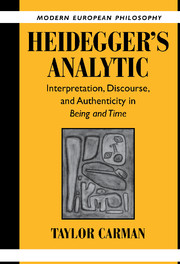1 - What Is Fundamental Ontology?
Published online by Cambridge University Press: 19 July 2009
Summary
God does not philosophize.
HeideggerThe central theme of Heidegger's philosophy is the question concerning the meaning (Sinn) of being (Sein). The “fundamental ontology” he advances in Being and Time departs dramatically from traditional ontology in that it asks not what there is, nor why there is what there is, nor even why there is anything at all and not nothing. The last of those questions, most famously associated with Leibniz and Schelling, is what Heidegger calls “the fundamental question of metaphysics.” It is a deep and important question, but it is not the question of fundamental ontology, for what it asks about is the totality of entities, not the meaning of being.
Heidegger's question, then, is not, Why is there anything? but rather, What does it mean for something to be? – or simply (redundantly), What is it to be? “What does ‘being’ mean?” Heidegger asks in his lectures of 1928. “This is quite simply the fundamental question of philosophy” (MAL 171). So, whereas traditional ontology was merely “ontic,” in that it occupied itself exclusively with entities, or what is (das Seiende), Heidegger's own project is “ontological” in a radically new sense in asking not just about what there is, but about being as such. Fundamental ontology is fundamental relative to traditional ontology, then, in the sense that it has to do with what any understanding of entities necessarily presupposes, namely, our understanding of that in virtue of which entities are entities.
- Type
- Chapter
- Information
- Heidegger's AnalyticInterpretation, Discourse and Authenticity in Being and Time, pp. 8 - 52Publisher: Cambridge University PressPrint publication year: 2003



